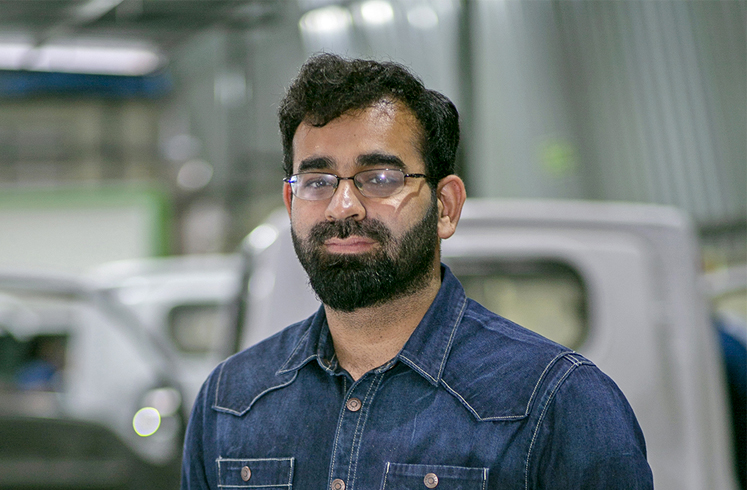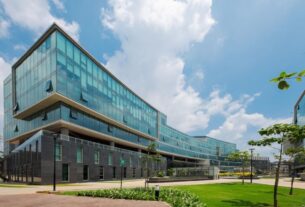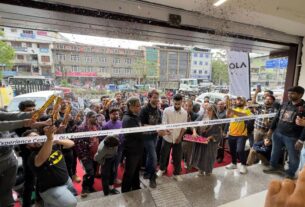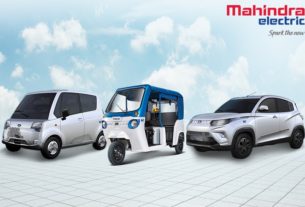Nakul Kukar, Co-Founder & CEO, Cell Propulsion, shares with Sarada Vishnubhatla his reason behind building a ‘powertrain first’ company, his strategy on large scale electrification of the CV sector in India, and talks about how the company is tempting customers with an ‘electric’ taste as they re-manufacture for them and leave them vying for more!

Nakul Kukar, Co-Founder & CEO, Cell Propulsion
As a ‘powertrain first’ mobility technology company, Cell Propulsion (Cell Prop), has found a niche which is allowing them to make a grand entry into the electric automotive domain. The Bangalore-based start-up was founded in 2016 with the purpose of providing solutions to the challenges in the burgeoning EV ecosystem. This will hold true as gradually the CV segment will start going electric at a large scale.
Nakul Kukar, Co-Founder & CEO, Cell Propulsion shares: “We are here to manage EVs on a large scale by creating an ecosystem to address the inherent issues like their maintenance, servicing, managing their power demand, insurance and financing all the support systems. And these problems will come up as fleets go electric at a large scale.”
Cell Prop integrates all the critical attributes of smart electric mobility to offer the market economical electrification solutions for intra city CV fleets.
He says: “While there were a few players in the electric 2-wheeler segment, the 3- and 4-wheeler segments were practically empty. But these domains did not offer technologically complex enough challenges for us. We also felt that more companies will mushroom in this particular segment as time went by. Hence, we focused on larger and heavier vehicles that would require complex engineered products since this domain will also have less competition.”
The Strategy
For Cell Prop, vehicle development and manufacturing pose the most complicated part of what they are delivering. The founders believe that this is a mere stepping stone to create a much larger ecosystem of products and services for the truck operators and trucking community which diesel vehicles may not be able to offer.

Nakul opines: “Our belief is that this ecosystem, the support services and new digital products would be far more valuable in future than the vehicle itself. We have always wanted to work on high power, high voltage systems. And this is the way to get ahead of the incumbents and this forms the core objective of our company.”
The starting point for the company was to build the initial products and technologies along with the core products including the motors, battery packs, and the electronics. And in their study of the market, they understood that it will be the CVs which will primarily drive the transition to EVs.
He agrees: “CVs drive a few hundred kilometres a day. The incentive for the operators and logistics companies to convert to electric will be savings and the reduced TCO. It was in 2019, when we began building the heavy commercial vehicle platform as part of retrofitting for BMTC which was a 100-kilowatt 600-volt power train platform.”
Re-manufacturing – Stumbling Upon A Great Idea
Two things were taken up simultaneously at Cell Prop and the whole idea was being driven more by technology and engineering rather than business. The partners began putting together battery packs and motors that they were developing for a larger eLCV which was 1-1.5 payload, besides re-manufacturing.

Nakul explains: “We stumbled upon re-manufacturing concept where we disassemble the complete vehicle and do a ground up assembly of the entire vehicle. When we are finished with a vehicle, only the chassis and the cabin remain pre-owned; while steering wheel, brakes, suspension, headlights, and the rest all are put in new. It is a fully-functional assembly line with our own quality standards and procedures.”
Remanufacturing approach has multiple advantages in the eyes of the customers. It is a low cost, low risk stopgap option to experience electric version of a vehicle because for the customer buying a brand new EV will cost almost double of what they will spend on re-manufacturing.
What Cell Prop is cashing in on is that this customer experience will, in time, give them an opportunity to launch their own brand of new EVs – the work on which will soon be underway. As the company grows and hits scale, they plan to invest in building their own chassis and cabin as well.
Cell Prop is currently talking to some of the largest logistics players, also major 3PL providers, in the country with huge fleets pan India to tempt them with their re-manufacturing capabilities.
Nakul adds: “In 2021, we deployed 10-15 vehicles each with shippers and 3PLs so that they could utilize them and offer us feedback.”

Ramping Up Scale
Cell Prop is catching up with the demand and the company hopes to ramp up in the next few months to embark on the next level of production output. The partners are in the process of raising funds to set up a larger production output and to eagerly start meeting the rising customer demands.
Nakul shares: “Capacity wise, we would be targeting 50-100 vehicles per month. Reality is that currently there is no other company doing this and our customers understand our constraints while supporting us. But they are simultaneously eager to start deploying small vehicles to just figure out the electrification bit.”
Cell Prop’s growth strategy is to deploy its vehicles in the middle mile to ferry cargo from say a warehouse in the suburbs to the fulfillment center in the city and e3-wheelers that take cargo from the fulfillment centers to different pin codes.
He claims: “Our vehicles have a 24-kilowatt hour battery pack at 96 volts in the current version, which provide a maximum range of 150 kilometers, and charges in one charge. They can go at a top speed of 60 kmph and are equipped with a motor with a 20-kilowatt power rating and a peak power of 30-kilowatt. Essentially, the performance is at par with a diesel vehicle, and the range is sufficient for a middle mile milk run.”
Since it is a milk run, Cell Prop has easily set up touch points strategically near the warehouses of all the logistics companies in Bangalore. These are the points where the vehicles not only get charged but are also serviced when they are parked there for the night.
Nakul says: “Our touch points will also be located near the highways where the LCVs ply to ferry goods from and to suburbs. In future, these points will also support larger electric trucks and buses as well. Initially, we can address cities and suburbs within the 100–150-kilometer radius. We believe we can cover 200-kilometer radius around any city in the next couple of years because 40-50% of the cargo movement happens within this distance. Also, agricultural, cold chain, construction and mining supply chains are built into this.”

The vibrant Cell Propulsion team
Brains Behind Technology
Developed inhouse, Cell Prop boasts of top-notch technology and products – right from the power train, hardware, to the software stack. In the last couple of years, the team has developed their core technologies of BMS battery pack which is already under production and Nakul hopes to follow suit with motor and motor drives also in the next couple of years.
He shares: “It will basically give us control over the power train and we would be able to customize our product as per the customer’s requirements.”
Expansion Plans
In the near future, Cell Prop plans to expand business into major metropolitan cities. The advantage of it lies in the fact that they have their existing customers already operational with whom they can simply start working. Essentially, it will only be a matter of upping their production, and connecting to them.
Nakul explains: “We will augment the next phase of growth by one facility in South India and ship the vehicles to other cities only for operations, with localized maintenance and servicing. Besides this, we get inbounds for these vehicles from many tier-2 cities, especially the industrial towns.”
The company’s vision in the next 5-10 years is to become one of the well-known and major players in the eLCV segment in India. And, Cell Prop is already well on its way to attain the goal!






